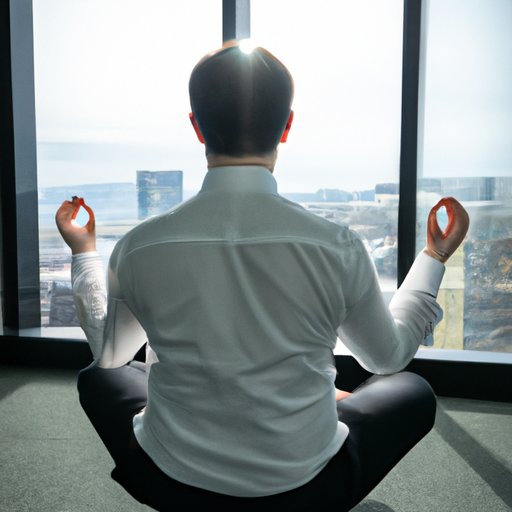
Introduction
In today’s fast-paced world, overworking has become a norm. The constant hustle of meeting deadlines, attending to responsibilities, and the never-ending rat race can make it difficult to find moments of respite. However, taking intentional breaks from our daily routine is crucial to maintaining our physical and mental health, productivity, and personal fulfillment. This article explores the science behind the importance of rest and the ways readers can incorporate intentional breaks into their routines for optimal health and productivity.
The Physical and Mental Benefits of Taking a Break from Daily Routines
Research shows that taking breaks helps reduce mental exhaustion, promotes productivity, improves cognitive performance, and lowers stress levels. By stepping away from daily routines, individuals can recharge their energy and recalibrate their focus, thereby increasing their work efficiency. Taking breaks also helps in reconnecting with loved ones and building meaningful relationships. Hence breaks are crucial to achieving personal fulfillment beyond the realm of work.
Tips for Recognizing When You Need a Break and Strategies for Incorporating More Intentional Rest into Your Routine
Recognizing when you need to take a break can be challenging, but it’s essential. Some signs of overworking or burnout can be irritability, fatigue, loss of quality sleep, and decline in productivity. Scheduling rest at intervals during the day or week is one way to ensure you take enough breaks. Scheduling breaks between tasks, such as taking quick walks or deep breathing for a few minutes, can help rejuvenate your mind and body. Engaging in relaxing hobbies such as reading, yoga, or cooking, can also keep you mentally refreshed.
The Science Behind Our Need to Rest and Why It’s Essential for Optimal Health
The science behind taking breaks to rest is fascinating. When we rest, our brain recharges itself, synthesizes new information, and consolidates our learning. Scientific evidence has shown that regular breaks enable us to retain more information for a more extended period. A rest period also facilitates the creative process by allowing more space, time, and inspiration to emerge. Engaging in leisure and relaxation activities stimulates the release of serotonin, responsible for creating a sense of well-being. Hence, taking rest is fundamental to our optimal health.
The Benefits of Mindfulness and Meditation for Finding Moments of Calm and Relaxation
Mindfulness and meditation have gained significant popularity in recent times for their potential benefits in reducing stress and anxiety. Mindfulness practices create a space for rest and self-reflection. It helps in cultivating focused attention and awareness of the present moment, reducing thoughts about past or future events. Mindful breathing and body scan are some methods of mindfulness practices that readers can try to experience moments of calm. Several resources offer guided meditations, so readers may explore techniques that suit them better.
The Importance of Taking Breaks While Traveling and Suggestions for Planning a Productive Yet Restful Vacation
Traveling is an excellent way to rest and relax. However, it can often be hectic, with travelers squeezing in several activities and destinations in a short time. This kind of schedule can cause more stress than relaxation. Planning a mix of productive and relaxing activities with sufficient downtime in between is an excellent way to rejuvenate without compromising productivity. Individuals should practice staying present and mindful while traveling, creating ritualistic experiences, putting aside digital devices to allow for breaks, and enjoying the adventure of exploration.
The Psychology of Procrastination and Why Sometimes Taking a Break is the Most Productive Thing You Can Do
One possible reason for procrastination or overworking is the fear of failure and the pressure of meeting deadlines. The constant anxiousness to complete a task or attain a goal can create more stress, often causing burnout. Taking a purposeful break helps break this cycle, refreshes our minds, and ultimately promotes healthier and more effective work habits. Using breaks to stimulate creative energy and improve focus increases the chances of successfully attaining set goals.
Conclusion
Incorporating intentional rest into your daily and weekly schedules can boost productivity, promote mental and physical health, and foster personal fulfillment. Taking breaks goes beyond stepping away from work but includes engaging in enjoyable activities that encourage relaxation and rejuvenation. Readers should take note of the tips discussed in this article and set achievable goals for incorporating rest into their routines, resulting in increased productivity, creativity, and a sense of rejuvenation.




